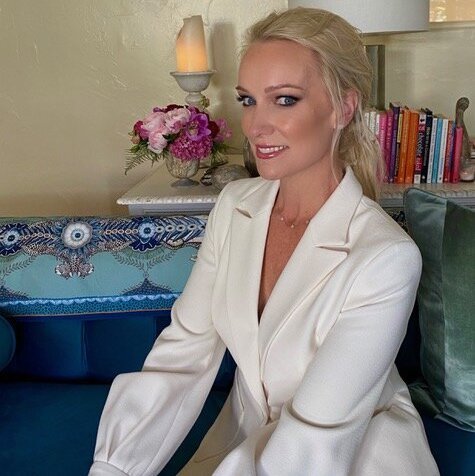My name is Amy Andersen I am the Founder and CEO of Linx Dating. I wake up around 6:30 am, and the first thing I do is drink coffee. It’s actually in my wedding vows that my husband brings me coffee in the morning. In our 15-year marriage, he’s pretty much never broken this vow- I must say it’s impressive. Then I get my kiddo's breakfast ready and quickly check my email and various messaging apps, including Signal, Proton Mail, and WhatsApp, to see if any high-profile or international clients have reached out overnight. After school drop off, I return home and do anywhere from 15-30 minutes of emails.
My morning workout is a must I typically run 3 days a week, rain or shine. Other days I mix in gym sessions or neighborhood walks. I listen to all sorts of music on my runs, from hip hop and, don’t laugh- military boot camp marine sergeant recordings. Post-workout, I shower and whip up a nutritious green smoothie. I practice a relaxed form of intermittent fasting, refraining from eating until noon, as part of my disciplined routine.
Back at home, I shower up and make one of my insanely delish green smoothies loaded with organic spinach, blueberries, almond milk, and Live Pure super food smoothie cubes! I also try to take my daily vitamins. I do a relaxed “my version” of intermittent fasting, do I try not to eat before 12 p.m.. If you haven’t noticed, I lead a pretty disciplined life. It’s a strategy that makes me successful.
My office is about a 5 min drive from my home. I have optimized on purpose for a better quality of life and not spend unnecessary time on the road. If I have to commute to San Francisco from Silicon Valley for a client, I always have a driver so I can get work done on my laptop- plus I’m not someone who lives to drive. It’s a necessity but not a sport for me.
My days are consumed by piling through an endless sea of emails. I get inbound inquiries on a daily basis from around the world of single men and women wanting to be matched. And as CEO of Linx, I always put myself in a prospect's shoes and ask myself, “What would it be like to email a dating service?” Even if I can’t help someone, I always make a point to write them a personal email. It’s a highly personalized and heart-centric business, so it’s very important for me to not only be kind but empathetic and respond.
Beyond this, I am on the phone with my clients throughout the day, getting feedback from their respective dates and strategizing with them about getting to the next level in their personal lives (from exclusive to engagement or married)!
I’m hydrating throughout the day- lots of water! I might be noshing on a salad throughout the day, fruit, another smoothie….or need a pick me up and grab an iced latte at Peets down the street!
I might be on a Zoom with a prospect one afternoon or on with my social media team, mapping out our content or planning a VIP client social campaign. My team is constantly monitoring trends and what’s relevant, teaching me, and keeping me up to date on everything.
I love slowing down with my family and going around the dinner table to discuss our days. It’s a moment during the day to be with one another, break bread, and catch up. I try to be home by 5 p.m. to make dinner for my family. I’m no chef, but I try to make healthy food. I’m vegetarian, and the rest of my family is not. This might mean a Door Dash salad for me and making pasta with Sautéed sausage and veg for them. I do a weekly menu on Sundays, but sometimes life gets crazy, and we need to adapt and be spontaneous. Once the family is off to bed, I catch up on emails for at least 1-2 hours every night. It’s also a time for me to match clients and think about “who” could be a fantastic fit with which client. I love how creative my job is!
Generally around 10 p.m. I will watch something brainless like Love Is Blind or The Golden Bachelor. It’s part of the job, right? I review my “To Do” List and Appts for the next day at the end of the day. I say some affirmations before bed and always think about my couples and clients. I literally visualize their happiness and success in the Matchmaking journey. I remind myself how grateful I am and so blessed to be celebrating my twentieth year in running Linx Dating.
I am lights out at midnight and ready to go again the next day!





